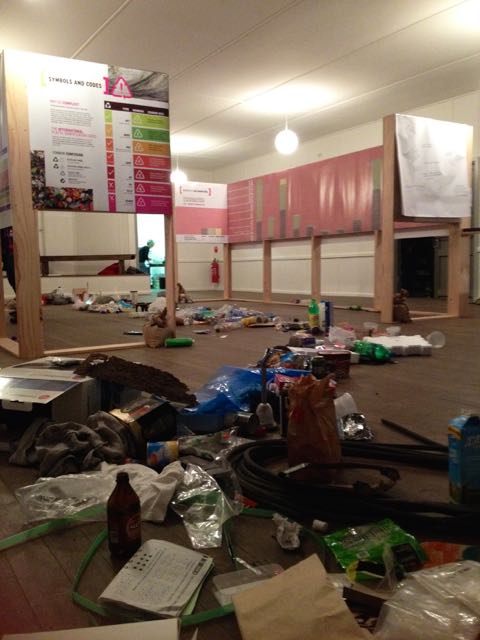The Modern Midden
The Modern Midden — another inconvenient truth
“Environmental changes are incremental and barely register in our lives but from evolutionary and geological perspectives WHAT IS HAPPENING IS EXPLOSIVE CHANGE.”
— David Suzuki
Jo Stirling’s project The Modern Midden, created as part of her Masters research, illustrates graphically, and in a way that we can all understand, how explosive that change has been and how vital it is for us to clean up the mess we have made.
Some may say she is preaching to the converted in Kangaroo Valley, a town proud of it’s status of being the first mainland town to stop using plastic bags. But I would doubt any visitor to the installation has come away without a better understanding of the issues and some ideas of what they could do better in their dealings with waste.
The residency began on Thursday 17 April with the showing of Trashed — a powerful and heart breaking documentary about what the human race has managed to “achieve” in a very short time and it’s devastating impact on the natural world. Eighty people came to the hall and bore witness to these crucial facts. It wasn’t easy to watch but it is vital viewing. We cannot afford to ignore this problem and hope it will go away. It won’t. Plastic is forever. And it is our problem!
But there are things we can do to stem the tide. There are things we can do now to make sure that the future generations will have an earth that is still inhabitable. A huge part of the problem is domestic waste and solutions can be found at a local level. Yes! Even in Kangaroo Valley. And that’s where Jo’s amazing graphic installation, which visualises waste through information design, comes into it. This wasn’t about turning waste into an attractive art installation (though that is certainly one way we can recycle and reuse waste). This was about messages and how graphic design can be used to help people see and understand this vital issue.
Created and built over a week at the Upper River Hall as part of an artist residency offered by the Upper Kangaroo River Progress Association, the installation provides information that we can easily understand about the processes and issues around recycling and waste. It offers the public the chance to learn, to think about what they can do in their own homes, to offer solutions, to ask questions, to explore waste in a constructive, creative way.
The residency and installation wrapped up on Sunday 27 April, with a production line sort of the waste that had been brought to the hall as part of the project, and a community BBQ to celebrate. But it doesn’t end here. The installation is now a prototype that Jo hopes will tour to other places and other communities. The engagement and input from the community will be analysed and form part of Jo’s Masters thesis and the discussions and questions about waste and how we deal with it must continue to happen.
To that end, here are some questions and ideas that were raised during this project that are relevant to our community things that we could try and do something about. Why don’t we have recycling bins in the village for tourists to separate their waste into? Why don’t we have a bulk co-op outlet in the village where we can buy rice, grains, flours, sugar and other goods using our own glass containers or paper bags?
How can we avoid single use plastics when making our purchasing decisions? What is the alternative to the plastic that cannot be recycled? How can we as a community lobby the NSW state government to adopt a ‘cash for containers’ initiative like they have had for years in South Australia. At the very least what can we as individuals do to REFUSE. RE-USE. RECYCLE.
If you think waste is someone else\’s problem, think again.
Sarah Butler

